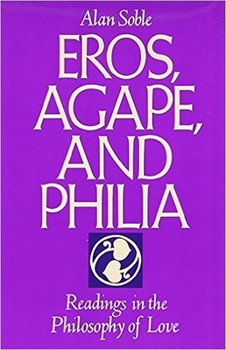Eros, Agape and Philia: Readings in the Philosophy of Love
For centuries, popular writers and respected scholars have written about and analyzed the phenomenon of love without exhausting its potential for contemporary debate. By representing the three major... This description may be from another edition of this product.
Format:Paperback
Language:English
ISBN:1557782784
ISBN13:9781557782786
Release Date:August 1998
Publisher:Paragon House Publishers
Length:330 Pages
Weight:1.14 lbs.
Dimensions:0.9" x 6.0" x 9.0"
Customer Reviews
2 ratings
Useful and concrete!
Published by Thriftbooks.com User , 15 years ago
In my English as Second language class, my teacher assigns to write about how the conception of Eros, Agaphe and Philia are present in our cinematography. The essay was of course, really interesting to do and this book help me much than others. The author point out the vision of Love in its diverses forms and how conception of love has stayed in our world since initial origins of humanity. Diverse cultures through the history has making strengthen to understand exactly what is that force that make us change and became in a new and better person living in society? What is that vital energy, which is present in everybody that made us treat others with respect, and in some opportunities, developed the more sublime feelings for each others? Love is a concept that everybody is concern about, many civilizations, religions and social movements had theorized about love. Therefore, love could be present in different places, and so, in different ways. Love has been represents in poems, songs, speeches, masterpieces, and performances. The book majestuositly explains the vision of Socrates and Aristoteles about the Greeck conception of Love and the complementarities between man and woman. Also, the presentation of Agape and Philia such as forms of love, conceived the unique and special condition of human beings. The book has important references such Erich Fromm. On the other hands, ofers The principal statement contained in the effect of Agape that is the understanding of equality between men. The idea of community becomes simple when he (man) understands the premise that we are all part of one, all human beings are identical. I recommend this book frankly.
A Look at Important Love Essays
Published by Thriftbooks.com User , 20 years ago
Soble provides this collection of primary writings dealing with the subject of love as a companion volume to an earlier volume of readings on the philosophy of sex. He does so believing that love is "such a rich phenomenon provoking questions in ontology, epistemology, the philosophy of mind, theology and philosophy of religion, and that to restrict the investigation of its many forms and dimensions to the ties between love and sexuality is to commit a painful, conceptual truncation" (ix). The contents of the book are broken into four main sections: "Where We Are;" "Classical Sources;" "Exploring the Classics;" and a contemporary analysis of love. Throughout the book, Soble often relates the word "love" to its various romantic implications. Soble's method in putting the book together is to provide three or four primary writings prefaced by a summary of the reason these writings are important. He introduces the entire book, however, by asking, "What is love?" "The complexity of this question - compare it to, What is a chair? - is reflected in the fact that so many different answers to it exists and debates about the nature of genuine love seem impossible to resolve" (xix). Love can be compared to art, for each is equally a difficult domain to describe. One of the reasons love is so difficult to explain is that the word refers to many different things. Often, however, the attempt to conceptualize love is framed with regard to the Greek love words - eros, philia, and agape. Soble believes that the general characterization of `eros-style' love arises in this way: x loves y because y has attractive or valuable qualities. `Agape-style' love is understood as x loving y independently of y's merit. This book offers original formulations of the theories of eros, agape and phileo and then attempts to explain more generally what these love types might mean for contemporary thinking. Thomas Jay Oord






